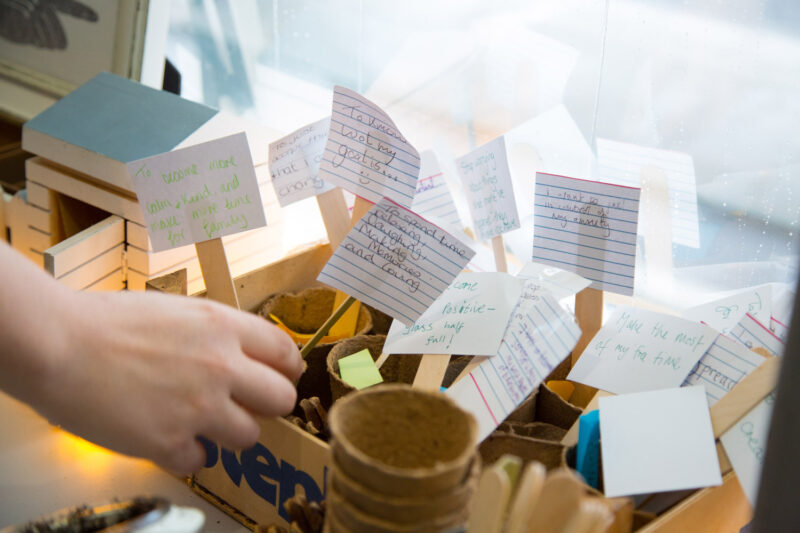



Personal and collective wellbeing has been at the forefront of Declaration and as Maddy Costa recently explored in Exuent Magazine, this extends much further than the play we are touring. As part of our tour of Declaration we offer a mobile wellbeing room called SPACE for audiences. SPACE is curated and run by Steph, our mental health practitioner.
Steph says, “Recently I was invited by Art with Heart to create and host a well-being room that could run alongside the performance of Declaration. The initial idea was to create a space where audiences could get support if they found aspects of the show difficult or overwhelming.
I’ve often questioned whether work that deals with sensitive topics has an ethical duty of care to its audience and so the prospect of theatre taking a considered and active stance toward the emotional wellbeing of its audience is an exciting and interesting idea to me.
My intention was to curate a space that echoes the ethical, non-hierarchical and holistic approach to mental health that I advocate. One in four people experience difficulties affecting their mental health at some point in their lives, so it seems important for us to engage in and create spaces where we can have an open dialogue about it.
The stigma surrounding mental health can be damaging and isolating. In response, SPACE is intended as a celebration. It is a nurturing neutral space – a space that is shaped by the people that occupy it. It is a space full of autonomy, a space for everyone, anyone – to simply be in, breathe in, talk in, chill in, interact in, laugh in. It’s a space where people can come as they are and leave when they like and engage or not with any elements in the room that they choose. It is a space where people take time to take care of themselves.


To date, SPACE has seen strangers gently plait each other’s hair in a bar in Hartlepool; it’s hosted an intimate group support encounter in a dressing room in Harrogate and witnessed a flurry of soil, seeds and planting in a youth centre in Wigan. Ultimately SPACE is an attempt to create a collective and ever-expanding resource of self-help and well-being from the minds of the Declaration audiences that we encounter UK-wide.
But do we actually need it and does it have any benefit?
Several leading psychologists have proposed that experiencing difficult events and emotions through film, theatre and art can help equip us to cope with similar experiences, should they arise in real life. By observing how artists, characters and performers deal, or don’t deal, effectively with problems, we can learn lessons about our own options and potential responses.
The transformative power of art is an incredible thing – but it can leave an emotional impact that is often overlooked. In therapy, the grounding process toward the end of a session is integral to looking after an individual’s sense of personal safety and well-being. The space for this kind of process in social art is notably absent, despite the intensity of emotions that may be evoked in audiences as a result of some productions.
The most progressive acts in society are those that create the solutions to prevent problems from developing; as opposed to waiting and responding to problems only when they’ve already arisen. Integrating awareness and incorporating a sense of collective care and responsibility for well-being and mental health into every day social and creative activities such as theatre is potentially a much needed and progressive step.


What if, from this day forward, each of us dedicated ourselves to becoming ‘well-being athletes’ – to taking a considered and active approach to looking after our own wellbeing; as well as taking a collective role in looking after the wellbeing of those we encounter/interact with – both on a personal, individual level but also as theatres, schools, colleges, workplaces? Would the world be better for it?
Perhaps the overall question isn’t one of responsibility or duty of care, but is something much more simple, more intrinsically human – Where we can, when we can, could we look after each other better?
Steph Walker is an experienced Mental Health Practitioner, Crisis Intervention Worker, Musician and Course Leader.
Steph has 15 years experience of mentoring and supporting adults and young people with a variety of every-day to complex emotional, practical and educational needs.
Steph encourages positive and inspirational creative activity in arts, health care, educational and public settings. She employs a comprehensive, integrated approach to health and wellbeing; rooted in the philosophy that each person is an individual with distinct personal experiences, histories, understandings, goals, needs and tools for coping. As such, Steph’s practice is holistic, relaxed, open, flexible and friendly.
